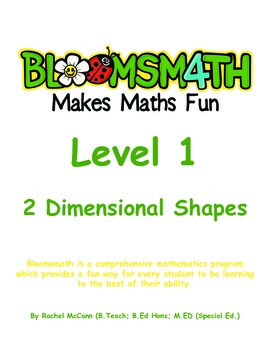Bloomsmath Differentiated 2D Kindergarten Maths Activities
Learn From Play - Teaching Resources
336 Followers
Grade Levels
K
Subjects
Resource Type
Standards
CCSSK.G.A.1
CCSSK.G.A.2
CCSSK.G.A.3
CCSSK.G.B.4
CCSSK.G.B.5
Formats Included
- PDF
Learn From Play - Teaching Resources
336 Followers
Description
Instantly differentiate your maths lessons with these FUN ready to print activity sheets that you and your students will love.
Based on Benjamin Blooms taxonomy, Bloomsmath allows every student to work to their fullest ability.
More able students remain motivated and keen to learn freeing you up to assist those students who really need you.
In addition to quality worksheets that are colourful, playful and fun, each Bloomsmath set also contains a questions guide you can use to get your students talking about maths and reflecting on their learning.
Level 1 is designed for students in their first year at school, Kindergarten. The 2D Shapes strand allows students to manipulate, sort and describe 2 dimensional shapes.
Bloomsmath by Rachel McCann is licensed under a Creative Commons Attribution-NonCommercial-NoDerivatives 4.0 International License.
Permissions beyond the scope of this license may be available at www.bloomsmath.com.
Based on Benjamin Blooms taxonomy, Bloomsmath allows every student to work to their fullest ability.
More able students remain motivated and keen to learn freeing you up to assist those students who really need you.
In addition to quality worksheets that are colourful, playful and fun, each Bloomsmath set also contains a questions guide you can use to get your students talking about maths and reflecting on their learning.
Level 1 is designed for students in their first year at school, Kindergarten. The 2D Shapes strand allows students to manipulate, sort and describe 2 dimensional shapes.
Bloomsmath by Rachel McCann is licensed under a Creative Commons Attribution-NonCommercial-NoDerivatives 4.0 International License.
Permissions beyond the scope of this license may be available at www.bloomsmath.com.
Total Pages
Answer Key
N/A
Teaching Duration
N/A
Report this resource to TPT
Reported resources will be reviewed by our team. Report this resource to let us know if this resource violates TPT’s content guidelines.
Standards
to see state-specific standards (only available in the US).
CCSSK.G.A.1
Describe objects in the environment using names of shapes, and describe the relative positions of these objects using terms such as above, below, beside, in front of, behind, and next to.
CCSSK.G.A.2
Correctly name shapes regardless of their orientations or overall size.
CCSSK.G.A.3
Identify shapes as two-dimensional (lying in a plane, “flat”) or three-dimensional (“solid”).
CCSSK.G.B.4
Analyze and compare two- and three-dimensional shapes, in different sizes and orientations, using informal language to describe their similarities, differences, parts (e.g., number of sides and vertices/“corners”) and other attributes (e.g., having sides of equal length).
CCSSK.G.B.5
Model shapes in the world by building shapes from components (e.g., sticks and clay balls) and drawing shapes.





